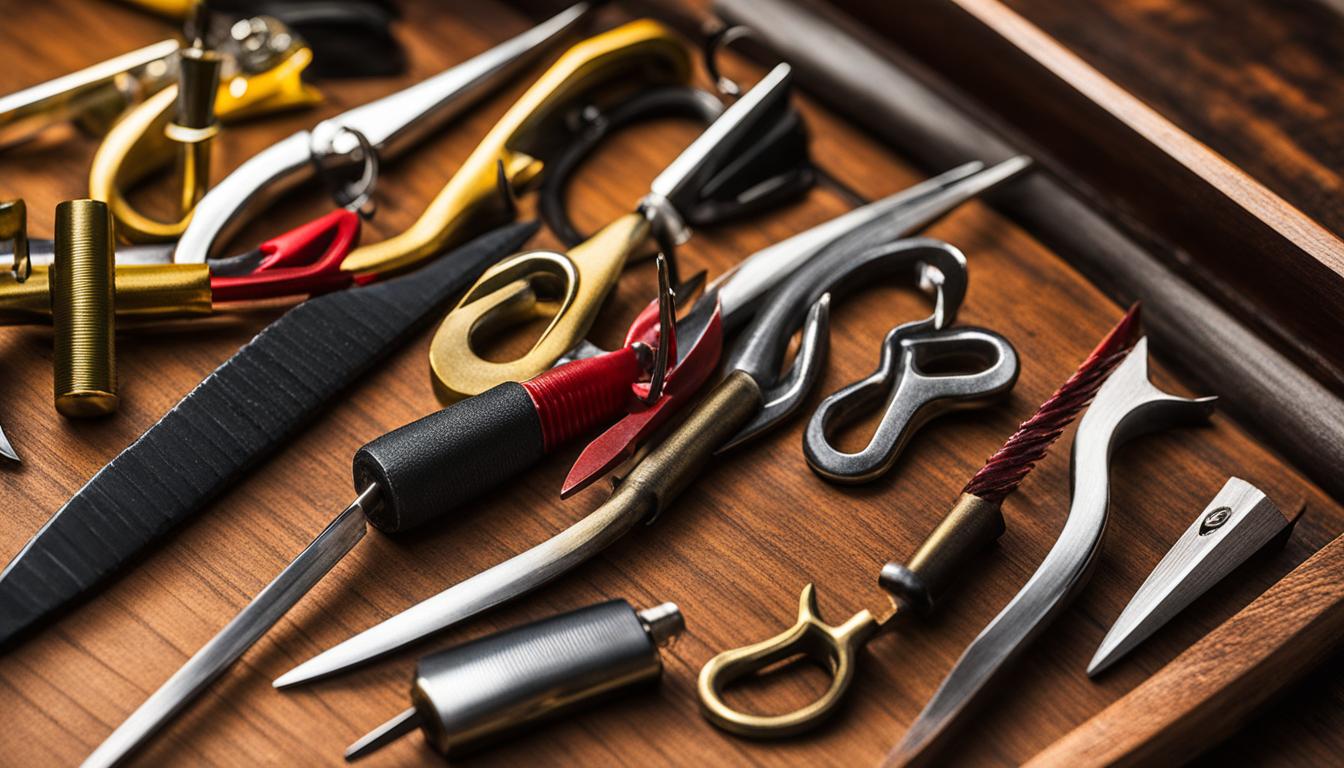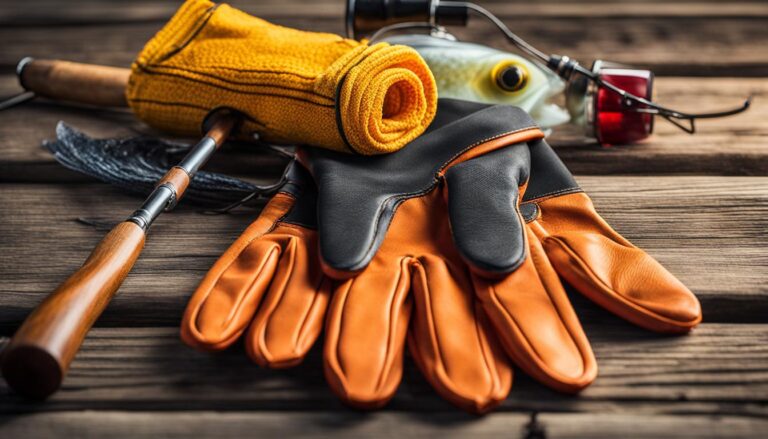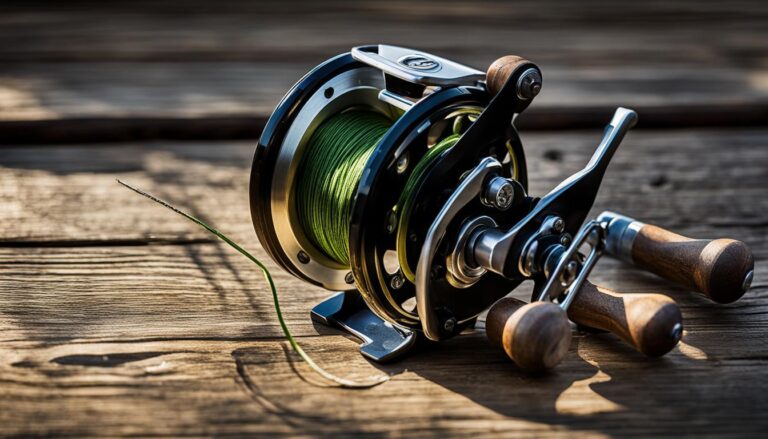Find the Best Fishing Hook Sharpeners for Your Next Trip

When it comes to preparing for your next fishing trip, having sharp hooks is essential. In this article, we will explore the top fishing hook sharpeners available on the market. We will look at the benefits and drawbacks of sharpening your hooks at home, as well as provide tips on how to properly sharpen your hooks. Whether you prefer electric sharpeners or portable sharpening tools, we’ve got you covered.
Key Takeaways
- Having sharp hooks is crucial for successful fishing
- Sharpening your hooks at home can extend their lifespan
- Proper techniques and tools ensure effective hook sharpening
- Consider the type of hooks and your sharpening preferences when choosing a sharpener
- Other essential tools for anglers include pliers, forceps, fillet knives, fish grippers, and de-liar devices
The Benefits and Drawbacks of Sharpening Your Fishing Hooks at Home
Sharpening your fishing hooks at home can be a cost-effective and convenient solution for anglers. It offers several benefits, including:
- Improved Hook Performance: By sharpening your hooks, you ensure they have a sharp point, increasing your chances of hooking a fish successfully.
- Extended Hook Life: Regularly sharpening your hooks can extend their lifespan, saving you money on purchasing new ones.
- Personalized Sharpening Techniques: Sharpening your hooks at home allows you to customize the sharpness based on your fishing style and target species.
Despite these advantages, there are a few drawbacks to consider when sharpening your fishing hooks at home:
- Potential Rust and Corrosion: Each time you sharpen a hook, you remove the protective coating on the outside, making it more susceptible to rust and corrosion. It’s important to properly maintain and store your hooks after sharpening.
- Possible Over-Sharpening: If you’re not familiar with the proper sharpening techniques, there’s a risk of over-sharpening your hooks, which can make them weaker and less effective.
- Time and Skill Investment: Sharpening hooks at home requires time and practice to develop the necessary skills for consistent and effective results.
Professional Fishing Hook Sharpeners
If you’re looking for a reliable and efficient way to sharpen your fishing hooks, professional sharpeners can be a valuable investment. These sharpeners are specifically designed to provide precise and consistent sharpening results, ensuring your hooks are in optimal condition. They often feature specialized sharpening surfaces and guides to help you achieve the correct angle and sharpness.
Professional fishing hook sharpeners come in various forms, including handheld models, electric sharpeners, and sharpening systems. Some popular options include the Smith’s Hook and Knife Sharpener, the Rapala Hook Sharpener, and the Work Sharp Guided Sharpening System. Before choosing a professional sharpener, consider factors such as the types of hooks you use, the sharpening method you prefer, and the level of convenience and portability you require.
| Sharpening Method | Advantages | Disadvantages |
|---|---|---|
| Handheld Sharpeners | Compact and portable Easy to use Cost-effective | May require more effort and time Less precise compared to other methods |
| Electric Sharpeners | Fast and efficient sharpening Consistent results Easy to use | Less portable May be expensive |
| Sharpening Systems | Allows for precise angle adjustments Offers versatility for different hook types | May be more complex to set up and use Less portable |
By weighing the benefits and drawbacks, as well as considering the type of fishing you do and your personal preferences, you can make an informed decision on whether to sharpen your fishing hooks at home or invest in a professional fishing hook sharpener.
How to Sharpen Your Fishing Hooks
Sharpening fishing hooks is a simple process that can be done with the right tools. One popular tool is the Cuda hook sharpener, which has grooves along the file to help guide the sharpening process. To sharpen your hooks, match the width of the hook point to the appropriate groove on the sharpener. It is important to pull the hook point towards the file, rather than filing against or away from it. This prevents metal buildup on the hook point and ensures an effective sharpening. Apply enough pressure to slide the hook against the file, but be careful not to apply too much.
Another effective way to sharpen your fishing hooks is by using a portable fishing hook sharpener. These compact tools are perfect for on-the-go sharpening, allowing you to maintain sharp hooks even while you’re out on the water. Simply place the hook into the sharpener and use a circular motion to file the point. Be sure to sharpen both sides of the hook evenly to achieve the best result.
Proper Technique for Sharpening Fishing Hooks
When sharpening your fishing hooks, it’s essential to follow the proper technique to ensure optimal sharpness. Here are some key tips:
- Hold the hook securely with a pair of pliers or a vise grip to prevent any accidents.
- Angle the file or sharpener at approximately 45 degrees to the hook point.
- Use smooth and consistent strokes along the entire length of the hook point.
- Avoid excessive grinding, as it may weaken the hook.
- Regularly check the sharpness of the hook by lightly running your finger over the point. It should feel sharp and catch on your skin.
| Types of Fishing Hook Sharpeners | Description |
|---|---|
| Electric sharpeners | These sharpeners offer convenience and speed, allowing you to quickly sharpen multiple hooks. They are perfect for anglers who want to save time and have a large number of hooks to sharpen. |
| Portable sharpeners | Compact and easy to carry, portable sharpeners are ideal for on-the-go sharpening. They are lightweight and can easily fit in your tackle box or pocket. |
| Manual sharpeners | These sharpeners require manual effort but provide precision sharpening. They often come with different grit options, allowing you to choose the level of sharpness you desire. |
Remember, sharp hooks are essential for successful fishing. By using the right sharpening tools and techniques, you can ensure that your hooks are razor-sharp and ready for action. Whether you prefer electric sharpeners, portable sharpeners, or manual sharpeners, there is a wide range of options available to suit your needs. Invest in a quality fishing hook sharpener and enjoy a more productive and enjoyable fishing experience.

| Feature | Electric Fishing Hook Sharpeners | Portable Fishing Hook Sharpeners |
|---|---|---|
| Convenience | High | High |
| Speed | Fast | Varies |
| Portability | Less portable due to power source | Highly portable |
| Sharpening Method | Electric | Manual |
| Sharpening Surfaces | Variety of options | Varies with different models |
| Durability | Varies | Varies |
Recommended Fishing Hook Sharpeners
When it comes to sharpening your fishing hooks, having the right tools can make all the difference. Here are some recommended fishing hook sharpeners that can help you maintain sharp and effective hooks for your fishing adventures:
Cuda Hook Sharpener

Smith’s aluminum fishing pliers are not only great for unhooking fish and managing various rigging tasks, but they also come with a built-in hook sharpener. These pliers are designed for easy use and convenience, allowing you to sharpen your hooks on the go without needing additional tools. They are sturdy, durable, and a must-have for any angler.
Automatic Fishing Hook Sharpeners
For those looking for a more automated approach to hook sharpening, there are automatic fishing hook sharpeners available on the market. These sharpeners take the guesswork out of sharpening hooks and provide consistent results. Simply insert your hook into the machine, and it will do all the sharpening for you. Automatic sharpeners are perfect for anglers who want a quick and hassle-free way to maintain sharp hooks.
By investing in professional fishing hook sharpeners like the Cuda hook sharpener, Smith’s aluminum fishing pliers, or automatic sharpeners, you can ensure that your hooks are always sharp, increasing your chances of hooking and landing fish. Remember to follow the best fishing hook sharpening techniques and regularly maintain your hooks for optimal performance. Happy fishing!
Tips for Finding Fishing Spots and Tracking Feeding Trends
When it comes to fishing, finding the right spot is key to a successful trip. Thankfully, there are plenty of resources available to help you discover new fishing spots and track feeding trends. By utilizing these tools, you can increase your chances of having a fruitful day on the water.
Smart Fishing Spots
One of the best ways to find fishing spots is through smart fishing spot platforms. These platforms use advanced algorithms to analyze various factors such as tides, wind conditions, and weather patterns to identify areas where fish are likely to be feeding. They provide real-time data and insights, allowing you to make informed decisions about where to fish.
Weekend Game Plans
Another useful resource is weekend game plans. These plans are typically provided by experienced anglers who share their knowledge and insights on where to find fish. They often include detailed information about specific fishing spots, recommended baits and lures, and the best times to fish. By following these game plans, you can save time and increase your chances of success.
Community Reports
Community reports are a valuable source of information for anglers. Many fishing communities have online forums or social media groups where members share their fishing experiences and tips. These reports can provide valuable insights into the current fishing conditions, including which areas are producing the best catches. By staying connected with the fishing community, you can stay up to date on the latest trends and increase your chances of catching more fish.
| Resource | Description |
|---|---|
| Smart Fishing Spots | Online platforms that utilize advanced algorithms to identify fishing hotspots based on various factors like tides, wind conditions, and weather patterns. |
| Weekend Game Plans | Guides and recommendations provided by experienced anglers detailing specific fishing spots, recommended baits and lures, and optimal fishing times. |
| Community Reports | Online forums and social media groups where anglers share their fishing experiences, providing insights into current fishing conditions and productive fishing areas. |
By combining these resources and staying informed, you can increase your chances of finding the best fishing spots and tracking feeding trends. Remember to constantly adapt your approach based on the conditions and to respect the environment and fellow anglers. Happy fishing!

The Essential Tools for Every Angler
To enhance your fishing experience and ensure success on the water, it’s important to have the right tools. Alongside fishing hook sharpeners, there are several other essential tools that every angler should have in their arsenal.
Fishing Pliers
Fishing pliers are versatile tools that can be used for a variety of tasks. They are particularly useful for unhooking fish, removing hooks from tough-to-reach places, and managing various rigging tasks. Look for pliers that are made from durable materials and have features such as corrosion resistance and a comfortable grip.
Forceps
Forceps are essential for delicate work, such as removing small flies or barbs. They provide a precise grip, allowing you to handle small hooks or flies with ease. Make sure to choose forceps with a fine tip that can reach into tight spaces.
Fillet Knives
When it comes to cleaning and preparing your catch, a good fillet knife is a must-have tool. Look for a knife with a sharp, flexible blade that can easily glide along the fish’s skin and bones. Consider the size of the fish you typically catch and choose a fillet knife that matches your needs.
Fish Grippers
Fish grippers are handy tools for safely handling fish while unhooking them. They provide a secure grip on the fish’s jaw, allowing you to handle them without harming yourself or the fish. Look for grippers with a comfortable handle and a strong mechanism that can securely hold the fish.
De-liar Devices
De-liar devices, such as scales and tape measures, are essential for proving the authenticity of your catch. They allow you to weigh and measure your fish, ensuring that you comply with any size or weight regulations. Consider getting a de-liar device that is accurate, portable, and easy to use.
| Tool | Description |
|---|---|
| Fishing Pliers | Versatile tool for unhooking fish and managing rigging tasks. |
| Forceps | Precise tool for removing small flies or barbs. |
| Fillet Knives | Sharp and flexible knives for cleaning and preparing your catch. |
| Fish Grippers | Tools for safely handling fish while unhooking them. |
| De-liar Devices | Scales and tape measures for weighing and measuring your catch. |
Equip yourself with these essential tools to make the most out of your fishing trips. Whether you’re sharpening your hooks, unhooking fish, or preparing your catch, having the right tools will enhance your fishing experience and help you achieve success on the water.

Conclusion
Sharpening your fishing hooks is an important aspect of successful fishing. It improves your hook-up ratio and extends the life of your hooks. To ensure optimal sharpness, choose the right fishing hook sharpener based on your preferences and needs. Whether you prefer electric or portable sharpeners, there are options available to suit your style.
To maintain sharp hooks, it is crucial to sharpen them correctly and regularly. This will ensure that your hooks are always in optimal condition for hooking and holding fish. By dedicating a little time to sharpening your hooks, you can significantly increase your chances of a successful fishing trip.
In addition to sharp hooks, utilizing resources for finding fishing spots and tracking feeding trends can greatly enhance your fishing experience. Take advantage of tools such as Smart Fishing Spots platforms and community reports to discover new fishing spots and stay informed about feeding trends. This will enable you to target areas where fish are likely to be feeding, increasing your chances of a fruitful trip.
Lastly, make sure you equip yourself with the essential tools every angler should have. Alongside fishing hook sharpeners, tools such as pliers, forceps, fillet knives, fish grippers, and de-liar devices will enhance your fishing experience and make your trips more enjoyable. So, get out there, armed with sharp hooks and the right tools, and have a fantastic time on the water. Happy fishing!
FAQ
Why is sharpening fishing hooks important?
Sharpening fishing hooks is important because it increases your chances of securely hooking fish and improves your hook-up ratio.
What are the benefits of sharpening fishing hooks at home?
Sharpening fishing hooks at home ensures they have a sharp point and can extend their lifespan. However, it can also remove the protective coating on hooks, leading to rust and corrosion if not done correctly.
How do I sharpen my fishing hooks
To sharpen your fishing hooks, use a tool such as the Cuda hook sharpener. Match the width of the hook point to the appropriate groove on the sharpener and pull the hook point towards the file. Apply enough pressure to slide the hook against the file, but avoid applying too much.
What are the best fishing hook sharpeners?
Some recommended fishing hook sharpeners include the Cuda hook sharpener and the Smith’s aluminum fishing pliers with a built-in hook sharpener. Automatic fishing hook sharpeners are also available for more convenience.
How do I choose the right fishing hook sharpener?
Consider factors such as the type of hooks you will be sharpening, your preferred sharpening method (electric or manual), and the quality and durability of the sharpener.
How can I find fishing spots and track feeding trends?
Utilize resources such as weekend game plans, smart fishing spots platforms, and community reports to discover new fishing spots and track feeding trends based on factors like tides, wind, and weather.
What are the essential tools for every angler?
Essential tools for every angler include pliers, forceps, fillet knives, fish grippers, and de-liar devices like scales and tape measures.






